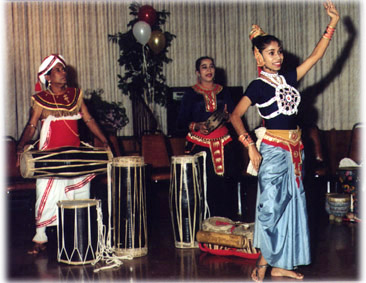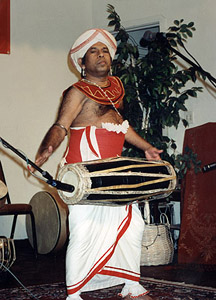
Noisy Toys interviews:
Piyasara Shilpadhipathi, Master Drummer of Sri Lanka
 |
NT: Please tell us about your family and how you learned to drum.
Piyasara: My family name Shilpadhipathi is broken into Shilpa meaning arts and Padhipahi meaning master. A king gave us that name in very early times and I began learning to drum at the age of 7 from my grandfather. He was a very famous drummer who played all types of Sri Lankan drums. He first taught me how to play Kandian drums and after that he taught me how to dance. Then I went to my Uncle and he taught me drumming on the twin drums and dancing. I went to a dance school and after 5 years I joined the Institute as a teacher of drumming and dancing. At that time I had been to some dance programs and rituals with my elders. Sometimes I danced and sometimes I played drums. I also met dancers who were performing on stage, but my ancestors only did ritual dancing and Buddhist rituals in the Temple. When I was 18 years old I went to the College of Fine Arts in Colombo to learn more about dancing, drumming and singing. I learned to play low country drums, something my ancestors had never done. Then I learned to play Indian tabla and other Indian drums. Ever since I was a child I have been learning about dancing and drumming.
NT: Your wife Kanthi and your daughter Madhavi also dance, sing and play drums. Has Kanthi always been involved in the music?
Piyasara: I met Kanthi at the Institute (in Colombo.) She was 2 years behind me and a very good singer. Her father is a painter. After we got married we started our own dance group and my daughter got to learn singing, dancing and drumming during childhood. Now shes a member of our group and all 3 of us teach. My daughter likes to teach children and they like studying with her the best. Shes 20 years old.
NT: Do you expect your daughter to pass along the tradition to her family and keep it going?
Piyasara: Yes. I think its a very important thing. In Sri Lanka at the moment most of the dancers and drummers try to be modern. They mix the traditional music and dancing with modern, so in another 10 years you wont see the pure Sri Lankan culture. We are the people to preserve this great culture for the future generations. If you dont preserve your own culture, no other nation will.
NT: Tell us about some of the ceremonies the Sri Lankan drums were traditionally used in.
Piyasara: The Sri Lankan drums are very old ... more than 2-thousand -500-years, according to our historical records. In the early times, the people used to play these drums only for their pleasure. Then they used the drums for worship and for communication, just like in Africa and other countries. There are 3 different dance traditions and each one has its own drum. The Kandian dancers used Kandian drums, or geta bera. Bera is the Sinhala name for drum. The low country dancers used dawula bera or yak bera. There are 6 different names for the same drum, depending on the ritual ... whether its a ritual for a god or for the devil. The dawula drum is very important in Buddhist religious ceremonies. The twin drum is called thammattama and that means not good to play alone. It is played with 2 sticks equally, like a snare drum. But it has 2 sides and 2 different sounds.
 |
NT: Why do you like sharing the Sri Lankan culture in the United States?
Piyasara: We have a very rich culture of dancing and drumming and singing. Sri Lanka is a very small island and a lot of Americans have never heard of it. I come to the U.S. because I like to share our great and very old culture with other people who appreciate it. Drumming is a universal language. If you play a kind of rhythm I can understand it because I have learned 10 different kinds of traditional Sri Lankan drums as well as tabla, a few African drums and a few North and South Indian drums. Once you have the principles of how to play, its easy to join with other drummers. I enjoy playing with other drummers from different countries |
<- interview index -

[ home ]